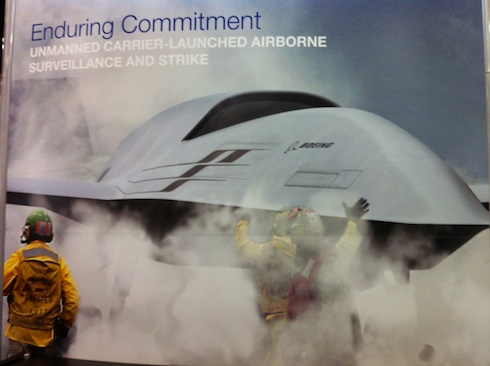Boeing To Pentagon: Be Careful When You Pause IRAD Programs
Posted on
PARIS: The Pentagon’s decision to pause as it reconsiders what path to pursue with the drone fighter known as UCLASS prompted Boeing to send a warning note today that the US military had better keep its commitments if it wants companies to invest their own money in new technologies.
Pressed by Rep. Randy Forbes and Sen. John McCain to rethink the requirements for UCLASS and make it a more intimidating long-range strike plane, the Pentagon decided to look again at the plane. The Navy and the top ranks of the Office of Secretary of Defense, as Breaking D readers know, are clearly split on whether the carrier drone should be primarily an ISR platform or a long-range strike asset.
Asked about the program today, Boeing’s Chris Raymond noted pointedly that his company “had spent a lot of time, and frankly, a lot of money on UCLASS over the years. We were — in our minds — in a great place,” he told reporters at a briefing in the company’s headquarters near the Elysee Palace, where French President Francois Hollande lives. “It was disappointing to see them pause.”
But the really worrying thing to Raymond, the outgoing head of business development and strategy for Boeing Defense, Space & Security, clearly was the longterm implications of the pause for Boeing and other companies whom Frank Kendall, head of Pentagon acquisition is pressing to take more risks and invest more of their own money in advanced technologies at the same time he tries to fund programs that help the companies keep key people working on those technologies.
“This is the delicate balance of going pretty far down the road — you spend a lot of money following your lead and then it just stops. Those are the kind of things that make it hard to climb up on the camel next time,” he said, in what may prove to be the most colorful quote of the show. (Perhaps a competition for best quote is in order?)
Raymond warned that, “if these things prove to be a bridges to nowhere for the industrial base then you can see why some people would pull back their R and D. That’s not a good thing for the industry. That’s not a healthy place for them to be, I think Secretary Kendall would agree with that.”
In an interesting tidbit, Raymond’s colleague, Jeff Kohler, said that some of the possible platforms being offered “do seem to be in conflict with some proprietary programs.” Pressed by a reporter just before the briefing broke up, Kohler, who heads Boeing’s international business development for military aircraft, clarified he that had meant to say classified. He did not identify any of the classified programs, nor clarify what he meant. (Perhaps he was referring to Northrop Grumman’s RQ-180 or to Lockheed Martin RQ-170, both stealthy classified aircraft.)
In other news, Raymond confirmed that Boeing has sold one of its excess C-17s to an unidentified customer and believes it has found buyers for another five. Boeing had eight aircraft left to sell. Two were sold to Australia. One went to the mystery buyer. And the other five, Kohler told us, should be sold by the end of the fourth quarter. There may be more than one buyer for the five planes
Subscribe to our newsletter
Promotions, new products and sales. Directly to your inbox.

